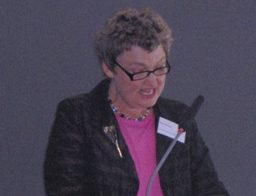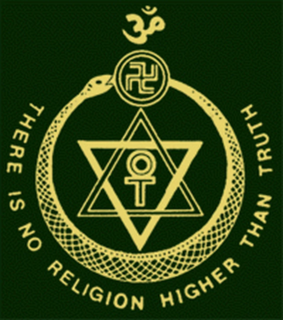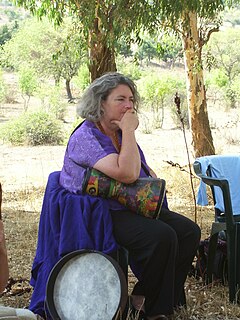Olav Hammer (born 1958) is a Swedish professor at the University of Southern Denmark in Odense working in the field of history of religion.
Olav Hammer (born 1958) is a Swedish professor at the University of Southern Denmark in Odense working in the field of history of religion.
Hammer has written four books in Swedish and one monograph Claiming Knowledge: Strategies of Epistemology from Theosophy to the New Age (2001) in English. [1] This volume, which was also Hammer's doctoral dissertation in 2000 at Lund University, investigates the rhetorical strategies of legitimization of a number of related new religious movements. Hammer is also editor of several books, including Polemical Encounters (with Kocku von Stuckrad, Brill 2007), The Invention of Sacred Tradition (with James R. Lewis, Cambridge UP 2007), Alternative Christs (Cambridge UP 2009), Cambridge Companion to New Religious Movements (with Mikael Rothstein, Cambridge UP 2012), and Western Esotericism in Scandinavia (with Henrik Bogdan, Brill 2016). He was from 2009 to 2016 one of two executive editors of the journal Numen . [2]
In 2002 the title of årets folkbildare in Sweden was bestowed on Hammer (an honor which could best be translated as "Public educator of the year"), by the society Föreningen Vetenskap och Folkbildning "for his balanced and pedagogical books about the history of new religions and the causes behind people's beliefs in pseudoscience."
Year 1252 (MCCLII) was a leap year starting on Monday of the Julian calendar.

A new religious movement (NRM), also known as a new religion or an alternative spirituality, is a religious or spiritual group that has modern origins but is peripheral to its society's dominant religious culture. NRMs can be novel in origin or they can be part of a wider religion, in which case they are distinct from pre-existing denominations. Some NRMs deal with the challenges which the modernizing world poses to them by embracing individualism, while other NRMs deal with them by embracing tightly knit collective means. Scholars have estimated that NRMs now number in the tens of thousands worldwide, with most of their members living in Asia and Africa. Most NRMs only have a few members, some of them have thousands of members, and a few of them have more than a million members.

Alice Ann Bailey was a writer of more than twenty-four books on theosophical subjects, and was one of the first writers to use the term New Age. Bailey was born as Alice La Trobe-Bateman, in Manchester, England. She moved to the United States in 1907, where she spent most of her life as a writer and teacher.

A Course in Miracles is a 1976 book by Helen Schucman. The underlying premise is that the greatest "miracle" is the act of simply gaining a full "awareness of love's presence" in a person's life. Schucman said that the book had been dictated to her, word for word, via a process of "inner dictation" from Jesus Christ. The book is considered to have borrowed from New Age movement writings.

The Grammis are music awards presented annually to musicians and songwriters in Sweden. The oldest Swedish music awards, they were instituted as a local equivalent of the Grammy Awards given in the United States. The awards ceremony is generally held each year in February in Stockholm. The awards were established in 1969 and awarded until 1972 when they were cancelled, then revived in 1987.
The academic study of new religious movements is known as new religions studies (NRS). The study draws from the disciplines of anthropology, psychiatry, history, psychology, sociology, religious studies, and theology. Eileen Barker noted that there are five sources of information on new religious movements (NRMs): the information provided by such groups themselves, that provided by ex-members as well as the friends and relatives of members, organisations that collect information on NRMs, the mainstream media, and academics studying such phenomena.

Indigenous religions is a category used in the study of religion to demarcate the religious belief systems of communities described as being "indigenous". This category is often juxtaposed against others such as the "world religions" and "new religious movements". The term is commonly applied to a range of different belief systems across the Americas, Australasia, Asia, Africa, and Northern Europe, particularly to those practiced by communities living under the impact of colonialism.
Steven Joseph Engler is a Canadian scholar of religion, Professor at Mount Royal University, Professor Colaborador in the Graduate Program in Ciêncas da Religião at the Pontifical Catholic University of São Paulo (Brazil), and affiliate Professor in the Department of Religion at Concordia University.

Numen: International Review for the History of Religions is a bimonthly peer-reviewed academic journal covering the history of religions of any regions and times. It was established in 1954 and is published by Brill Publishers on behalf of the International Association for the History of Religions. The editors-in-chief are Laura Feldt, and Greg Alles.
Lorne L. Dawson is a Canadian scholar of the sociology of religion who has written about new religious movements, the brainwashing controversy, and religion and the Internet. His work is now focused on religious terrorism and the process of radicalization, especially with regard to domestic terrorists.

Margit Warburg is a Danish sociologist of religion. Since 2004, she has been professor of Sociology of Religion in the Department of Cross-Cultural and Regional Studies at the University of Copenhagen. She was an associate professor at the same university from 1979 to 2004.
Heinrich Wilhelm Schäfer was born in 1955. He currently holds the chairs of Protestant Theology and Sociology of Religion at the Faculty of History, Philosophy and Theology and the Faculty of Sociology, Bielefeld University. He is member and co-founder of the Center for Interdisciplinary Research on Religion and Society.
Catherine Wessinger is an American religion scholar. She is the Rev. H. James Yamauchi, S.J. Professor of the History of Religions at Loyola University New Orleans where she teaches religious studies with a main research focus on millennialism, new religions, women and religion, and religions of India. Wessinger is co-general editor of Nova Religio: The Journal of Alternative and Emergent Religions. She served as a consultant to federal law enforcement during the Montana Freemen standoff and has been cited for her expertise concerning the Branch Davidians and other apocalyptic groups. She is the editor of the Women in Religions series at New York University Press and she is co-editor of the Women in the World's Religions and Spirituality Project, part of the World Religions and Spirituality Project.
Mikael Rothstein is an associate professor of religious history at the University of Copenhagen in Copenhagen, Denmark.

Guy Gedalyah Stroumsa is an Israeli scholar of religion. He is Martin Buber Professor Emeritus of Comparative Religion at the Hebrew University of Jerusalem and Emeritus Professor of the Study of the Abrahamic Religions at the University of Oxford, where he is an Emeritus Fellow of Lady Margaret Hall. He is a Member of the Israel Academy of Sciences and Humanities.

Ferdinando Sardella is a Swedish scholar of the history of religions, Hinduism, and religious studies, the former director and coordinator of the Forum for South Asia Studies at Uppsala University.

Theosophy is a religion established in the United States during the late 19th century. It was founded primarily by the Russian immigrant Helena Blavatsky and draws its teachings predominantly from Blavatsky's writings. Categorized by scholars of religion as both a new religious movement and as part of the occultist stream of Western esotericism, it draws upon both older European philosophies such as Neoplatonism and Asian religions such as Hinduism and Buddhism.
Cognitive science of new religious movements is the study of new religious movements from the perspective of cognitive science. The field employs methods and theories from a variety of disciplines, including cognitive science of religion, sociology of religion, scientific study of religion, anthropology, and artificial life. Scholars in the field seek to explain the origin and evolution of new religious movements in terms of ordinary universal cognitive processes.

Modern Paganism and New Age are eclectic new religious movements with similar decentralised structures but differences in their views of history, nature, and goals of the practitioner. Modern Pagan movements, which often have roots in 18th- and 19th-century cultural movements, seek to revive or be influenced by historical pagan beliefs. New Age teachings emerged in the second half of the 20th century and are characterised by millenarian ideas about spiritual advancement. Since the counterculture of the 1960s, there has been interaction, mutual influence, and often confusion in the popular mind between the movements.